#catra meta
Explore tagged Tumblr posts
Text
"Light Spinner" was honestly the most heartbreaking She Ra episode I've seen so far

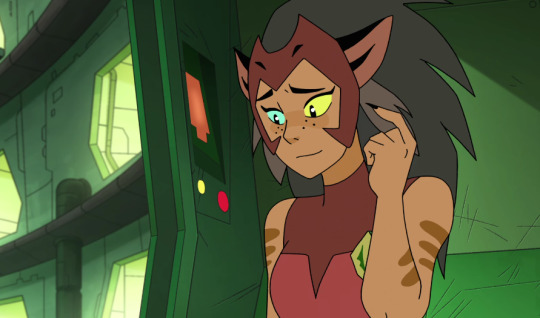
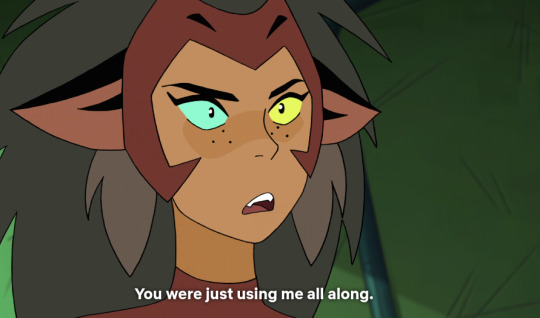
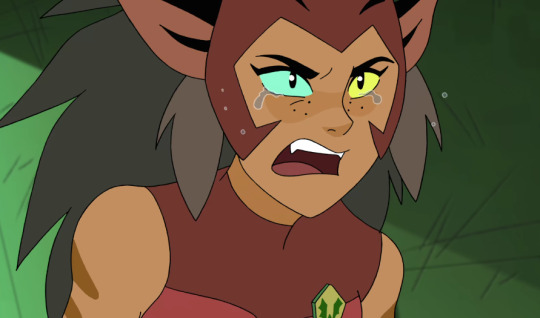
Catra constantly insists she is nothing like Shadow Weaver in any way, but the parallels between her journey and Shadow Weaver's as Light Spinner are not even subtle. Shadow Weaver even says they are similar, that she reminds her of herself. And as much as Catra insists she doesn't want that, of course she wants that. She wants them to be similar because she thinks that Shadow Weaver will finally love her and appreciate her if she's another version of her, only better, if she doesn't make the same mistakes, if she comes out on top. She hates her so much but she also wants to BE her, but the thing preventing her from following in Shadow Weaver's footsteps is the best part about her. It's her capacity for love and kindness. It's her lack of selfishness and greed. She never wanted to rule the hoard or be second in command, but she feels like she has to be even as her own nature rebels against it.
#it astounds me when people say Catra wasn't well written#look at this#its right in front of you#she wants love but the only way she knows to get it is power#I am going to cry#I already have but I'll do it again#and shadow weaver can go die in a hole with no one to love her for doing this to catra#catra#shadow weaver#spop#she ra and the princesses of power#catra meta#spop meta#I'm still only on season 2 but I feel like I sort of know where this is going#DIE shadow weaver DIE#why shadow weaver deserves death: a saga
216 notes
·
View notes
Text
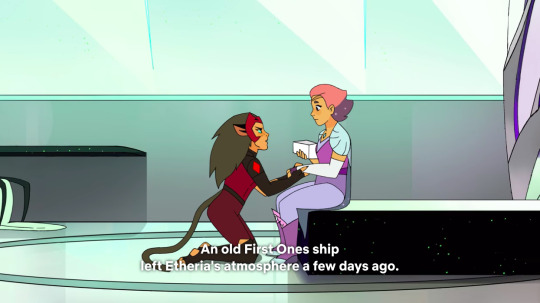
Do you ever think about how, in this scene, Catra could've spoken with both of them standing up, or loomed over Glimmer sitting on the bed in order to intimidate her, and instead Catra drops to her knees and holds Glimmer's hand
Because I do
Catra's so conflicted at this point--she's still saying she doesn't care about Adora, but her facial expressions and body language keep betraying her real feelings
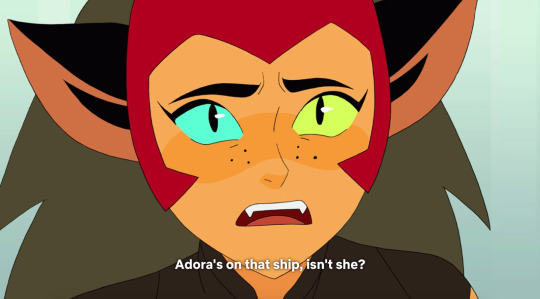
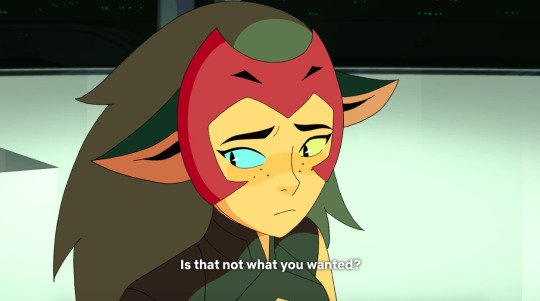
But even before that conversation with Glimmer--there's the one where Horde Prime accuses Catra of protecting Adora, then offers to free Catra of her memories of Adora, only for Catra to bristle without a word and then look terrified--
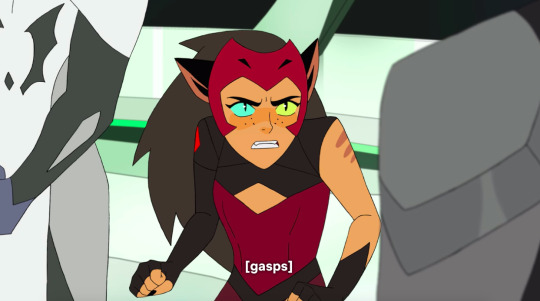
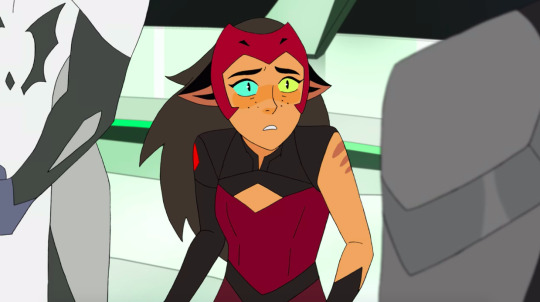
It's not fear of the green pool shocking her, or being added to the hive mind--he threatened her with that after that moment
I love all the little ways they make it obvious how close she is to finally changing sides, to making that decision to save Adora's (and Glimmer's) life, so that when she does you're just cheering for her. You know it didn't come out of nowhere--that she's been wavering for a while.
143 notes
·
View notes
Text
Failsafe puts on stilettos and does a tap dance on my heart for a lotta reasons, but these are the ones i feel like ranting on today~
i can’t get enough of this moment. when adora finally sees it and takes the first opportunity she gets to say it right to this bitch’s face--
it seems like the whole episode are these shared, full-realizations of the other’s trauma and that, while their experience of it differs and so it produced distinct effects for each of them, it’s still very real and has taken its toll on them both--

and is still taking its toll.
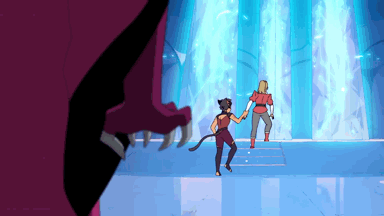
and it’s a savage slaughter on my emotions when catra calls out sw ^^ for her typical tricky bull shit and she audibly says “why are you surprised by this?!” & immediately her voice gets lost in the others' and their indignant words in defense of adora, but catra goes on to say something like:
“she doesn’t care about adora! adora can’t even care about herself!”
and that’s it. the moment you know: catra’s gotten to the bottom of it. she’s figured it out and she's prob so angry at herself for (due in part to her own trauma tho) not seeing it sooner.

all those times she said adora just needed to be the hero, it was quite literal in a way far more unhealthy than catra had ever realized. any problem that arose; if there were lives on the line; adora needed to fix it, no matter the cost. if it had to be someone, it needed to be her. a necessity of which praise was a small perk but for which glory was never the goal. on the contrary, it was even more devastatingly toxic for adora than that.
want is not a sin. there are many clarifications i could make to that, but if you're a decent human being, i shouldn't need to.
and yeah, they both fall prey to the trauma of their careful grooming one more time.
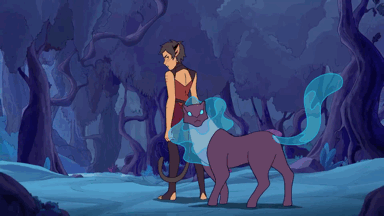
but ultimately, they both embrace love in order to overcome it.
catra decides that if adora can’t let up and simply has to do this, she’s going to do it with her. disregarding the insecurity that adora doesn’t need her, so she’s just following her around; instead, catra stands beside adora with the conviction that she’s there because that’s where she wants to be.
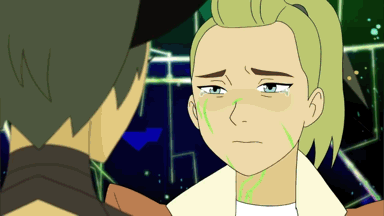
and adora finally allows herself to want love. as adora. just adora.


not only acknowledging that she deserves it,
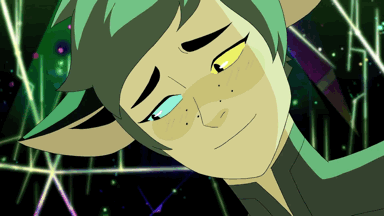
but even letting herself accept it.

<3
#spop#she ra#catradora#spop failsafe#spop heart part 2#adora#catra#spop rant#spop analysis#she ra meta#fck off shadow weaver!#spop gifs#love >
112 notes
·
View notes
Text

I was so excited to actually have confirmation of the timeskip we all knew happened before Season 4 only for ND to immediately derail the convo into jokes 😂
[source]
#spop#shera#she ra#entrapta#glimmer#catra#nd stevenson#crew-ra#she ra and the princesses of power#things from twitter#spop meta
179 notes
·
View notes
Text
She-Ra's abuse narrative: fail or prevail?
So you might have heard about this cartoon called She-Ra and the Princesses of Power. And if you've heard about that, then you've definitely heard about Сatradora — an enemies-to-lovers ship between two women who must overcome their traumatic childhood to find love in each other, widely popular among fans and beloved by the showrunner ND/Nate Stevenson. His decision to canonize the couple in the final season was met with near universal acclaim, being compared to the likes of Korrasami (The Legend of Korra, 2014) and Bubbline (Adventure Time, 2018) in terms of queer subtext finally made text.
That could be the end of it, but then you wouldn't be reading this.
We’re here right now to talk about a real sore spot that never fails to incite berserker rage in the fandom: the question of abuse. It’s pretty much the main topic of the entire show, so naturally the romance that capped it off would have something to say about that. The catch is, people can’t agree on what it did say. Depending on who you ask, the union of Catra and Adora is either a perfect conclusion to a story of healing that proves abuse victims deserve to be loved, or it's a slap in the face of those same victims that sacrifices the story's core values to appease the shippers. Abuse and shipping being issues that people are famously not chill about, the debates on the matter can get nasty.
I have a lot of thoughts about it myself and I desperately wanna put them all down somewhere so they stop bouncing around in my head like a DVD screensaver. Thus I present you a detailed breakdown of the way She-Ra and the Princesses of Power handles abuse as a theme in context of Catra and Adora’s relationship. Take a sip of water every time you read “abuse” for a week's worth of hydration.
A few disclaimers before I go to town:
As you can probably tell by now, this is not light reading. I wanted to cover everything I could think of, and the line between exhaustive and exhausting begins to blur when you have this much to work with.
Though I didn't feel like getting a psychology degree for the sake of this meta, I researched the topic and provided my sources, so all the information here should be accurate.
Healthy discussion is welcome, but I reserve the right to ignore anyone acting aggressively or in bad faith.
With that out of the way, we can finally start…
Defining the subject
What even is this “abuse” thing people keep going on about?
It’s sometimes characterized as any action that intentionally harms or injures another person — such is the phrasing you’ll find at the Free Dictionary, for example. But that’s… broad, and covers anything from soldiers fighting in war to someone tripping you on the sidewalk. I’ve turned to more specialized sources, namely: The Center for Relationship Abuse Awareness, National Domestic Violence Hotline, Love Is Respect, and Healthline. They all say more or less the same thing, which we’ll put down as follows:
Abuse is a pattern of behaviors used to maintain power and control over another in an interpersonal relationship.
The key word is “control”. While abuse comes in many different types and kinds and forms, it is always a metaphorical leash that allows the abuser to feel powerful at the expense of someone else. This is something you need to understand before you can answer the question of…
How She-Ra and the Princesses of Power writes abusers
She-Ra and the Princesses of Power, henceforth SatPoP, is aaaall about abuse. What it looks like, how people respond to it, why it even happens, etc. Most major antagonists in the show are abusive, and if you examine them closely enough, you could parse out something like an abuser formula. My theory goes that every abuser in the show does three specific things that, when taken together, are a dead giveaway to their role in the narrative. Here's why:
So first, we’ve established that the lynchpin of abuse is control. Not coincidentally, this is a word that crops up very often in SatPoP's dialogue, starting with this pithy phrase.
Madame Razz: “Wicked people destroy what they cannot control.” (Razz, 1:3)
The wicked people in question is the Horde. The Horde cannot be literally abusive because it’s not a person, but it is a toxic, exploitative force that tries to dominate everything around it and leaves only misery in its wake. The allegory is hard to miss. And when we do meet the Horde personified, his last decision is to try and destroy what he cannot control, so this line is both a long-reaching foreshadowing and a thesis statement for the entire show. Later (or earlier?…), this exchange takes place.
Mara: “I need the Sword to control She-Ra’s magic. That’s what my superiors always told me.” Madame Razz: “Ha-ha! She-Ra was here long before your people arrived. You cannot control magic! Magic simply is.” (Hero, 4:9)
Here's a clear juxtaposition: the First Ones — you know, the greedy colonizers who take advantage of idealistic young women — posit control as the key towards true power, but Madame Razz — the Iroh wise old mentor character — rejects this idea. She gives Mara a better advice rooted in actually connecting with the world around her instead of subduing it to her will, as demonstrated by their encounter with the boar-thing. The idea of rejecting control shows up a couple of times since as a rebuttal to tyranny and oppression.
Adora: “I won’t be controlled.” (Destiny II, 4:13)
Entrapta: “You can’t control us!” (Heart II, 5:13)
Thusly, we can claim that control in the show is more or less synonymous with abuse, except for a few cases where it’s not directed towards other people. Put a pin in this for now. Also, I'm sorry if “control” doesn't sound like a word anymore.
The second point deals with fantastic exaggeration. One of the ways to create exciting conflict in fiction is to upscale a more ordinary, familiar situation. If you’re trying to portray a heated argument? Turn it into a swordfight. If you’re trying to portray chronic illness? Turn it into a magical curse. If you’re trying to portray puberty? Turn it into a spider mutation! This approach allows you to crank up the tension while keeping the core emotional struggle easy for the audience to grasp and identify with. As a magical girl comedy drama, SatPoP makes full use of this method to explore complex themes in fantasy setting. Adora struggles with anxiety and pressure that many “gifted children” can relate to, except her concerns are less about getting good grades and more about saving the universe from an evil intergalactic army. Glimmer has trouble coming to terms with the grief of losing a loved one, except the consequence of that is nearly being killed by a giant monster. Peel back the hyperbole and you’re left with these very real, grounded problems. Then suppose you’re trying to broach the subject of abuse in a way that fits the high stakes of your story. What would be its logical extreme? I mean… nothing says control like literal mind control. Brainwashing is the most dramatic way of conveying the message that anyone who seeks to have complete power over another will end up robbing them of personhood. Take out another pin here.
Now since SatPoP is ultimately meant to have an uplifting tone, the forces of evil have to be defeated in the end. A victim becomes a victor by reclaiming control, or in other words, going against their abuser’s rhetoric. Like this.
Shadow Weaver: “You’ve learned nothing from me!” Catra: “I’ve learned everything from you! How to predict when you’ll strike, how to dodge, how to resist! You thought you were punishing me all these years? Wrong. You were training me for this day!” (Light Hope, 1:12)
Horde Prime: “Did you hear me, little brother? Do it now.” Hordak: “I am not your brother. You made me in your image, but I am more than that. I gave myself a name; I made a life of my own; I made… a friend. I am Hordak, and I defy your will!” (Heart II, 5:13)
Beyond just fighting back, they challenge a specific negative belief about themselves that the abuser wants to impose — that Catra is incapable, that Hordak is nothing but an extension of his maker — and get narratively rewarded for it. The majority of these epic denial speeches fall to Adora though. Protagonist privileges.
From all this we can derive three checkpoints. Every abuser in the show…
✔ Is described as controlling
✔ Attempts to violate someone’s free will through supernatural means
✔ Has the tables turned on them at a point of near-victory through their victim's affirmation of self-worth
Otherwise known as the three Cs: control, compel, and contradict. To prove the existence of this pattern, we’ll start with the trendsetter herself — Shadow Weaver. Pointed out as a control freak?
Shadow Weaver (disguised as Catra): “Shadow Weaver controls us both. She always has.” (In the Shadows of Mystacor, 1:7)
For sure. Tries to brainwash someone?
Shadow Weaver: “You are correct, Adora; you shall stay willingly. Because I am going to wipe your mind. You’ll have no memory of She-Ra or the time you spent with the Rebellion— Everything will be as it once was! As for the Princess, once I’m done, you’ll be happy to have her as your prisoner.” (No Princess Left Behind, 1:9)
Definitely. Told off by Adora?
Adora: “You never loved me. You just played your twisted mind games. I’m none of the things that you say I am. I’m not like you. You are bitter, and cruel, and you’re the one who used me! This is who I am. You hurt my friends. So now you’re gonna pay. […] I’m not going back. You have no power over me anymore!” (In the Shadows of Mystacor, 1:7)
Hell yes! Not in this exact order, but with all these elements present. Try it with the First Ones now. Control:
Entrapta: “So the First Ones made the Sword to control [She-Ra]. To use her.” (Destiny I, 4:12)
Compel:
Entrapta: “Once the planet is balanced, no one can stop it. Not even the First Ones could control it — that’s why they left! When the weapon is activated, it will channel all its power into you. You don’t get to refuse.” (Destiny I, 4:12)
Contradict:
Adora: “I won’t be controlled. I am not a piece of their machine. I am not a weapon. And I’m going to end. this. now!” (Destiny II, 4:13)
And lastly, Horde Prime.
Catra: “Horde Prime is taking control of Etheria!” (Taking Control, 5:6)
Horde Prime: “I made her anew. I saw her mind — so ensnared in rage and grief and pain. So I brought her to the light.” (Save the Cat, 5:5)
Adora: “No. You’re wrong. It’s time for you to go.” (Heart II, 5:13)
There you have it: three checkpoints, three abusers… and four acts.
Thing is, SatPoP can be divided into chunks of thirteen episodes, each signifying a different period in the story and having its own subplot. That’s the four act structure. It would’ve been four seasons too if someone hadn’t decided to do what Voltron: Legendary Defender did before and release content in smaller batches, leaving Act II cleft in twain. Given that every abuser we’ve reviewed so far had their to-do list ticked off in a single act — consider this an extra checkpoint on itself, really — that leaves a conspicuous gap.
Is there a character who's marked as controlling, who tries to force someone’s hand using magic, who gets put in their place by Adora after failing to break her, and who accomplishes all that in Act II?
Catra: “Are you kidding? I’ve got control of Adora; I am not giving that up.” (White Out, 2:5)

Catra: “As long as we have this Sword, we have the power to make her go berserk. We can turn the Rebellion’s own hero against them. That’s good. I wonder which of your friends I’ll have you annihilate first.” (White Out, 2:5)

Adora: “No, it’s not [my fault]! I didn’t make you pull the switch. I didn’t make you do anything! I didn’t break the world. But I am gonna fix it. And you? You made your choice. Now live with it!” (The Portal, 3:6)
Fits like a puzzle piece. What were the odds? But wait! There’s more!
Visual cues
A visual cue is essentially a shorthand that serves to draw the audience’s attention towards something without being heavy-handed about it or taking up a lot of time. Here’s a few examples of how it can be done: We’ve all watched Avatar: The Last Airbender, right? Then you probably remember how that show emphasizes different sides of Zuko’s face depending on the phase of his character development. His scar is emblematic of his father’s abuse, so putting it front and center is a clear indicator that he’s acting from a place of hurt. Another story that puts a lot of accent on abusive dynamics is Tangled (2010). Here mother Gothel is shown being overly affectionate with Rapunzel’s hair, in contrast to Eugene pushing the hair away so he can see more of her face. Since the hair in question has cool magical powers, you can deduce just from that which character cares about her as a whole person and which one only values her for the parts they can use.
SatPoP does not fall behind in the abuse-related imagery department. I’ll start with the cheek touch, since the show uses this one a lot. …like, a lot a lot.

Shadow Weaver practically owns the cheek touch, though Horde Prime’s never been deterred by things already belonging to someone else. It can be roughly sorted into two varieties: the “nice” and the “mean”. “Nice” means the abuser is hiding behind a veneer of benevolence and leveraging the victim’s deepest desires in exchange for obedience. Adora yearns to prove herself, so Shadow Weaver allows her the opportunity. Catra yearns to be loved, so Shadow Weaver gives her a taste of that. Glimmer yearns to save her people — well what do you know, Shadow Weaver can help here too! It’s giving “I will grant you whatever you want, but only as long as you behave”.

Then there’s the “mean” variety, when all masks are off except for the literal one. If in previous examples the victim either had the option to refuse or just didn’t mind, then this time the parties are in open conflict, and the abuser blatantly flaunts the fact that they’re in a position of power by forcing their victim to experience unwanted physical contact. It’s giving “I will take whatever I want from you, and there’s nothing you can do about that”.

And Catra hasn’t only been on the receiving end of this message.

Which brings us to these proxy cheek touches. What Double Trouble and Horde Prime have in common is that they understand Catra — whether it’s because they’ve peered into every nook and cranny of her mind or because they’re just that good. Therefore they know what the dynamic between her and Adora is like, and they act on that knowledge by making Catra cup her cheek. Why? While “to tease her about her crush” is a popular interpretation for… obvious reasons, this reading ignores larger context. Sure, in any other show this kind of touch might've been prime shipping fuel, but in SatPoP’s language it nearly always translates to manipulation and power play. Double Trouble says “you pushed her away”; the gesture adds “by making her feel lesser”. Horde Prime says “you can’t save her”; the gesture adds “remember what happened when you tried”.
But hold on a sec, why “nearly” always?

One exception is Angella. She’s not quite playing by the rules here, and the reason is simple: cheek touch, like I said, is as good as trademarked by Shadow Weaver, and Angella is the resident anti-Shadow Weaver. Her foil, if we’re being technical. Both are military leaders who also happen to be mothers, but where Shadow Weaver puts the “mentor” in “tormentor” despite an occasional maternal impulse, Angella is deeply caring beneath her coldness and strict attitude. Them being associated with the same visual motif makes the contrast stand out even more. Notice that both times Angella puts her hand on someone’s cheek it’s in the moment of choosing people’s needs over her own desires. She wants Glimmer to be safe and out of the battlefield, but knows her daughter would never rest easy if she wasn’t helping her friends. She wants to stay with the husband she hasn’t seen in years, but understands that her duty lies elsewhere. Angella’s affection is selfless, and that, more than anything else, is what sets her apart from Shadow Weaver. A few more examples are in Season 5’s section. If you have any pins left, this would be a good place for one.
For now we move on to electricity, an element favored by three of our not-so-fantastic four.

Catra: “Pretty good, huh? I got the idea from Shadow Weaver. At least she was good for something in the end.” (Flutterina, 4:3)

This might be a reference to Avatar: The Last Airbender, where lightning was used as an abuse metaphor. ATLA is a rather obvious inspiration for the show so it’s entirely plausible. Electrocution also has the benefit of being a non-gorey method of torture, allowing for some surprising brutality without technically breaking the age restrictions. Of course, just like the cheek touch, it does have exceptions. But instead of selflessness vs selfishness, the deciding factor here is protection vs punishment. That’s where Adora, Glimmer, and Scorpia differ from Shadow Weaver, Catra, and Horde Prime, even though all of these characters electrocute someone at some point.
The next and last recurring motif is perspective. You know how abusers tend to look down on their victims? Well, SatPoP took that a bit literally.

Not content with just being very tall, Shadow Weaver likes to up the intimidation factor by appearing as this great looming figure. It’s a good graphic representation of how abusers make themselves feel bigger and stronger than they actually are by making others feel small.

Catra seems to dig the angle too.

She’s often keeping Adora beneath her, whether it’s by following Obi-Wan’s example and getting the high ground or making her fall on the ground.

The Portal in particular puts Adora through this ordeal more times than is strictly necessary, but it does help emphasize the eventual reversal: Adora is now the one standing above Catra in a moment of payback and catharsis. They can’t be on an equal level because Catra doesn’t see Adora as an equal and balance can only be maintained through mutual effort. After Adora realizes that, she puts herself in a position where Catra won’t be able to bring her down anymore — literally or figuratively.
At this point you must have spotted something of a running theme: Catra is a copycat-ra. Unfortunately for everyone, her role model is the second worst person alive who tried really hard to be the first and only lost by a couple of genocides. The similarities between them are everywhere but they're at their most in-your-face obvious in The Portal. Again. Seriously, this episode is competing with White Out for who can scream “Catra is abusive!” the loudest.

It’s not hard to get what sort of feelings the interactions between Shadow Weaver and her wards are trying to inspire in you. Sympathy, because they're hurt and scared and vulnerable. Disgust, because Shadow Weaver is treating someone like dirt just to feel a sense of superiority. Horror, because this is a far too real scenario. Then the show deliberately takes these skin-crawling, nausea-inducing incidents of abuse and re-enacts them between Catra and Adora.
Why should they be perceived differently now?
The framing didn’t change. Adora is not any less terrified and Catra is not any less terrifying. If you weren’t supposed to view their relationship as abusive, then whoever storyboarded these scenes should’ve gotten fired faster than you can say “Eternia”.
This so far has only been about narrative devices, not real-life tactics, but worry not: there’s plenty to be said about that. Starting with…
Verbal abuse
For all the talk about sticks and stones, verbal abuse remains one of the most effective tools in abuser’s toolbox. Defined as “the use of hurtful language to assert control” and often synonymous with emotional abuse, it encompasses a wide range of behaviors, from straightforward insults to subtle condescension. Like all types of abuse, it’s a recurring pattern that exists within an interpersonal relationship, which is what sets it apart from just calling someone a poopyhead. While words cannot indeed break your bones, they might do something worse than that — break your spirit. The hows and whys of it come down to one word: familiarity. See, people are weirdly eager to believe stuff they’ve heard multiple times, even when they already knew it’s false. This bizarre quirk of our brains is called illusory truth effect. Other fancy science terms like mere-exposure effect and schema work on a similar principle. So if continuous reinforcement is this good at drilling stuff into your head, and the thing that's being continuously reinforced is how bad you are… The result is that verbal abuse erodes self-esteem in much the same way water erodes stone. You don’t see the damage as it’s happening; in fact it’s hard to believe that something as insubstantial as water could damage solid rocks at all. But it does. Drop by drop, word by word.
Shadow Weaver: “Insolent child. I’ve come expect such disgraceful behavior from you, but I will not allow you to drag Adora down as well. You have never been anything more than a nuisance to me.” (Promise, 1:11)
Shadow Weaver: “Catra has been nothing but a disappointment to me!” (Razz, 1:3)
Shadow Weaver: “You’ve always been a disappointment. You’ve learned nothing from me!” (Light Hope, 1:12)
Shadow Weaver: “I assumed Hordak finally realized what a lazy, worthless creature you are and banished you.” (The Frozen Forest, 2:1)
At least one person would call it the opposite of a problem though. As far as Shadow Weaver is concerned, a day not spent berating children is a day wasted.
Shadow Weaver: “You were nothing before I took you in, Adora, and you will be nothing without me!” (In the Shadows of Mystacor, 1:7)
Shadow Weaver: “Clever. You always were. The moment I laid eyes on you I knew you were different. You were—” Adora: “Special? No. What you always told me was that I didn’t matter. I was ‘special’ only as long as I obeyed you.” (The Price of Power, 3:1)
This is yet another patented technique of hers, not that it stops Catra from parroting her anyway.
Catra: “When did you get so weak?” (The Sea Gate, 1:5)
Shadow Weaver: “You’re weak!” (In the Shadows of Mystacor, 1:7)
Catra: “And it won’t be over until I see the looks on your friends’ faces when they find out that you failed, that you were too weak to save them.” (The Battle of Brightmoon, 1:13)
With a few targeted remarks she saps Adora’s will to go on,
Adora: “Fine, you win. You want me to be weak? Well, I am. And I’m afraid. Because I’m no good at any of this.” (The Beacon, 1:10)
Adora: “It’s too late. I’ve failed.” (Heart II, 5:13)
feeds her insecurities,
Adora: “I don’t want any of you risking yourselves. She-Ra can do this alone. This is what she’s for.” Bow: “Adora, not even She-Ra can take out an army of Horde soldiers all on her own.” Adora: “Then what good is she⁈” (The Battle of Brightmoon, 1:13)
Catra: “Tired already? I thought punching was supposed to be like, the one thing you’re good at?” (The Battle of Brightmoon, 1:13)
undermines her confidence,
Adora: “I wanna be the best She-Ra. I wanna protect the planet! But Catra, she’s just… in my head.” (The Frozen Forest, 2:1)
Catra: “If you hadn’t gotten captured, your Sword wouldn’t have opened the Portal. If you hadn’t gotten the Sword, and then the world’s worst She-Ra, none of this would’ve happened! Admit it, Adora! The world would still be standing if you had never come through that Portal in the first place.” (The Portal, 3:6)
and affirms her greatest fears.
Adora: “I hurt people; I ruined my friends’ lives!” (Light Hope, 1:12)
Catra: “You’re the one who left the villagers unprotected. You’re good enough at hurting your friends without my help.” (Flutterina, 4:3)
This specific variety of verbal tactics is known as…
Guilt-trip
Guilt-tripping is a subtype of emotional abuse that leverages the feelings of, well, guilt. It’s a really uncomfortable emotion that puts the victim in a defensive position — they’re usually too busy trying to prove they’re not terrible to accuse anyone else of being so. As for Adora, she’s not so much guilt-tripped as guilt-hamstringed.
Adora: “I’m sorry. It’s my fault she was here; I endangered Mystacor.” (In the Shadows of Mystacor, 1:7)
Adora: “How could I let this happen?…” Bow: “Adora, it’s not your fault.” Adora: “It is my fault. Entrapta’s gone because of my plan.” (The Beacon, 1:10)
Adora: “Commander, it’s my fault. I—” (The Beacon, 1:10)
Adora: “[Glimmer]’s hurt because of me; I messed up. I got Glimmer and Bow captured, and Entrapta… It’s— It’s my fault!” (Light Hope, 1:12)
Adora: “I thought I could get through to [Catra], but all I did was push her further to the side of evil. Light Hope said I’d endanger my friends by coming back, and she was right. Everything that’s happening now is my fault…” (The Battle of Brightmoon, 1:13)
Adora: “Catra will make me watch all of it before she finishes me off, and then everyone is gone, and the Horde wins the war, and Etheria crumbles and it’s all my fault!” (Roll With It, 2:4)
Adora: “It’s all my fault! I-I’ve been so afraid of becoming another Mara, destroying the world the way she did, and now… it’s happening.” (Remember, 3:5)
Adora: “It must have been a diversion so that I’d leave Elberon defenseless. And-And I fell for it! This is my fault.” (Flutterina, 4:3)
Adora: “I’m sorry. It’s my fault you got hurt.” (Pulse, 4:4)
You don’t need Mermysteries-level deductive reasoning to trace the origin of those thoughts…
Shadow Weaver (disguised as Bow): “Everything that’s about to happen is your fault, Adora. You’re to blame.” (In the Shadows of Mystacor, 1:7)
Shadow Weaver: “Mystacor will fall, and it will be your fault!” (In the Shadows of Mystacor, 1:7)
…or to predict that Catra will ape her in this as she does in everything else.
Catra: “Let’s be honest here — all of this is your fault.” (The Portal, 3:6)
Catra: “You broke the world, and it is all. your. fault.” (The Portal, 3:6)
Not only with these exact words, either.
Shadow Weaver: “Adora, you must do a better job of keeping [Catra] under control. Do not let something like this happen again.” (Promise, 1:11)
Catra: “You made me this! You took everything from me!” (The Portal, 3:6)
They both make choices to harm people and then claim it’s Adora’s responsibility to stop them by appeasing their demands. Be the perfect soldier, or your friend gets it. Choose me over the rest of the world, or there won’t be a world. Comply, or you’ll make me do something horrible. Speaking of doing something horrible and not owning up to it…
Gaslight
Gaslighting is not just a type of illumination. The term comes from a 1938 play Gas Light, in which a husband drives his wife mad by dimming the lights and then denying it. Deliberately creating a discrepancy between someone’s perception and their idea of reality convinces them that their own mind can’t be trusted — hard to imagine a more vulnerable position.
Shadow Weaver (disguised as Glimmer): “I think Adora has finally lost it! Did you see her in there? I think she’s going nuts!” Adora: “I’m not crazy!” *Adora sees that no one is around* Adora: “I’m… I’m not crazy.” (In the Shadows of Mystacor, 1:7)
I’m running out of animal analogies here, but you know the drill by now.
Catra: “You’ve officially lost it, haven’t you?” (Remember, 3:5)
Catra: “You’ve gone crazy!” (Remember, 3:5)
It’s really worth noting that some of the phrases from National Domestic Violence Hotline’s What is gaslighting? are things that Catra says to Adora word-for-word. A monkey on a typewriter would have better chances of stumbling into this exact phrasing than any dialogue writer who did basic research into their theme of choice and didn't want Catra to sound like an abuser.
Catra: “You’re just seeing things. It’s all in your head.” (Remember, 3:5)
Catra: “I don’t know what you’re talking about!” (Remember, 3:5)
But does she know what Adora’s talking about?

Yes. The scenes that most clearly prove it follow pretty much the same steps: Adora confronts Catra about what’s happening; Catra’s old memories are triggered; she gets defensive and tries to shut Adora down to maintain the façade. The only part that might not be immediately obvious to the viewer is that the first memory flash was experienced by Catra and not Adora. She describes her vision this way:
Adora: “I remember… a sword, a-a bright light, and you were ther—” (Remember, 3:5)
which is obviously referring to her finding the Sword, getting flashbanged by it, and then being woken up by Catra. But that's not what we see. And it's not Adora whose face the camera stays focused on like it did every time before. This is a bit subtler than the show usually prefers, but don’t worry, because all subtlety is gone out the window in their second argument. By that point, if Catra’s guilty expression and shifty eyes don't alert you to the fact that she’s lying, then a glowing neon sign stating exactly that wouldn’t make a difference.
On two separate occasions it's made clear that Catra knows something’s up and chooses to discredit Adora anyway. She’s not acting out of genuine ignorance but a stubborn desire to keep things “perfect” at any cost, even when the cost is Adora’s faith in her own sanity.
Adora: “I don’t know what’s happening to me. It’s like I’m losing my mind.” Catra: “You just need to relax.” Adora: “Yeah. Yeah, you’re probably right. I’m fine. Everything’s fine…” (Remember, 3:5)

Adora’s body language — crossing her arms, hunching her shoulders, looking away — indicates someone who is deeply uncomfortable. She's growing more and more certain that Catra has done something seriously bad to her and that she's not safe with her anymore, but there's just enough doubt that Adora can't take any decisive action about it. The creeping realization that someone you've trusted with every part of you is actually a threat makes Remember into a borderline psychological horror.

Adora: “I know this is wrong; can’t you see it⁈ My memories don’t match; we’re jumping around; things are disappearing; it’s like time and space aren’t working right. And I—” Catra: “Adora, stop it. Stop!” (Remember, 3:5)
Catra's not just concerned. She’s angry that Adora won’t just shut up and accept her version of reality — a reality that doesn’t require Catra to acknowledge and face repercussions for all the ways in which she’s harmed Adora. Remember what I said about hyperboles in fiction? Strip this episode of portals and magic swords and all that nonsense, and what you’re left with is a person who wants to escape the fallout of their decisions so badly they’re willing to delude someone close to them until their world is falling apart before their eyes. Despite having gaslighting as its main focus, though, it also provides a striking example of a different tactic…
Physical abuse
We all know that generally, beating people up is bad. And yet a term was coined specifically for characters who start hitting on each other after just hitting each other — that ubiquitous “enemies-to-lovers” thing that plagues every SatPoP discussion. This inevitably muddies the waters, as it poses the question of how to identify physical abuse in a dynamic that must include violence by design. There’s some nuance to the problem. We could ask whether they fight for external or personal reasons, whether they have lines they won’t cross or will they stoop to anything, and what’s probably most important, whether they attack each other equally or is there an obvious aggressor. You're certainly welcome to ask yourself that. It shouldn't be hard.
But! for the sake of keeping our waters as clear as possible, I’ll draw a hard line and not count anything that happened in context of enemy battles as physical abuse. So, does Catra hit Adora when they're not locked in honorab— well, just in combat?

Yes. Case closed; moving on.
Repentance or
—no, fine, I may as well be thorough to the end and analyze these scenes in full, even if the point has already been proven. The first one takes place almost at the very beginning. Adora has just defected, but crucially, they are not treating each other as enemies yet, or else Adora would not turn her back to Catra and Catra wouldn't bother making excuses for stabbing her in said back.
Catra: “…oh man, that was a lot stronger than I thought. Are you okay?” Adora: “Catra!—” *Catra electrocutes her a second time* Catra: “I’m sorry! It was a reflex.” Adora: “Why… why are you doing this?” Catra: *pause* “Because you left me! And if I don’t bring you back, Shadow Weaver’s gonna have my head. So enough with this weird little identity crisis, and let’s go home already. Or do I need to zap you again?” (The Sword II, 1:2)
She says she didn't mean to hurt her. Then she hurts her again. Then threatens to hurt her again. Then attempts to hurt her again. For comparison, this is Catra's expression after her other shocking betrayal.

That's the thing: we know what Catra looks like when she regrets it. And she never looks like that when it comes to Adora.
Then, because abuse is a cycle, they go through the same motions in Remember.
Adora: “Ow! What was that?” Catra: “Sorry! You were freaking out, and it was freaking me out!” Adora: “Well you didn’t have to slap me!” Catra: “Come on, let’s get you outside; you need some air.” (Remember, 3:5)
Once again, Adora learns that her life is a lie and starts to break out of it. Once again, Catra immediately responds with anger and violence. Once again, she brushes right past Adora's indignation and tries to just paper over the whole affair until things go back to “normal”, the way they always have.

And look, I hear you. She's just a kid. We can't hold someone this young fully responsible for their actions, let alone brand them the most evil of anklebiters that ever learned to count to four. Just this once, I'd like to remove blame from the equation. It wasn't Catra's fault. That does not mean it isn't an important look into their dynamic all the same. We aren't asking who deserves to be punished here — that would be Shadow Weaver — we're asking what happened and what it means for the characters going forward.
So Catra is upset that her friend has been hanging out with Lonnie. There's probably some normal childish jealousy mixed in, but from a trauma standpoint, she's likely terrified that the one thing standing between her and her abuser is slipping away. Whatever the context behind it though, the situation is more or less the same: Catra feels that Adora is threatening their relationship, and the only thing she can think of is to lash out until she gives in. Not a surprising reaction for a desperate, panicked child soldier-in-training to have, but it's one that Catra simply refuses to grow out of. Her present-day actions demonstrate that she never stopped viewing pain as a means of correcting Adora's behavior. Maybe she's not as quick to resort to it. Maybe sometimes she'll just use cutting words instead of cutting claws. Maybe she'll even apologize after the fact. After all, she's not a child anymore, so her violence is actually thought-out. Deliberate. Either way, the second Adora steps out of line Catra will go from affectionate and playful to aggressive and pitiless until she gives in… or gives out.

I'll keep my promise and not bring in the scary A-word when they're at least ostensibly fighting for their respective factions, but I will call Catra's behavior what it is: cruel. It's cruel and vicious and needlessly brutal in a way she isn't towards anyone else she faces off against, and certainly not in any way Adora's been towards her. The goal is not to incapacitate — it's to hurt. That kind of unflinching willingness to cause harm doesn't come out of nowhere.
…but enough dwelling on the past! It doesn't matter if Catra pushed her into water off a bridge, because it's all water under the bridge. They've turned a new leaf, done a 180°, started from scratch— okay, that one is poor phrasing. Point is, it's all behind them now. Right?
Repentance or repetition
Interrupting my barrage of hot takes with a lukewarm but nonetheless correct take: Catra should be redeemed. More than that, her redemption is necessary for the story to achieve its full potential. And while I get why people say it should've begun earlier, I actually think its placement in the story makes sense. I've mentioned briefly that all four parts of the show have their own unique attributes. Act I is mostly introductory, establishing the cast and their position in the world without moving things forward too much. Act II is where the plot really kicks off, with the first mentions of a mysterious weapon and a wider universe. Act III in turn is a downward slope where everyone, heroes and villains alike, are starting to unravel and hit rock bottom. What then, you may ask, defines Act IV? Change. The status quo shattered along with She-Ra's sword. Etheria being overrun means there is no longer a comfort zone to retreat to. Nearly every constant you've gotten used to over the last four seasons is ripped away, pushing the characters into uncharted territory and forcing them to adapt. Thematically speaking, this is the perfect time for Catra to finally leave her old habits behind and start anew.
Did she though?
Catra: “I keep having this horrible vision of a blonde girl, who thinks she's better than everyone, barging into my room all day. Oh, wait.” (Taking Control, 5:6)
Catra: “I told you not to come back! But you just love feeling like a hero, don't you⁈” (Taking Control, 5:6)
If you think this line sounds kind of familiar, that's because it's almost the same thing she said back in Promise when their relationship completely fell apart.
Catra: “You always need to play the hero, don't you?” (Promise, 1:11)
I said it's not too late to redeem Catra in Act IV, and I stand by that. But it only holds true if the creators make full use of the time they have instead of ignoring the epiphanies she already had and having her go back and forth some more like an actual cat who can't decide if they want in or out the damn door. Or better yet, emphasizing that she hasn't changed at all halfway through the last season. Whenever you feel bad about your time management skills, remember that at least you aren't responsible for that. (If by chance you are, DM me. I have questions.)
Catra: “Then you've even dumber than I thought.” (Taking Control, 5:6)
Catra: “I always knew you were kinda dumb, but… come on.” (The Sea Gate, 1:5)
As Catra echoes her previous lines, so does Adora. Echo Catra, that is.
Adora: “I'm such an idiot.” (Taking Control, 5:6)
Catra: “You're such an idiot.” (Save the Cat, 5:5)
Whether it was intended as “light-hearted teasing”, if Adora immediately comes back to it when she's distraught and insecure then that's not what it was. I sure hope Catra doesn't repeat this later on!
Catra: “You're such an idiot.” (Heart II, 5:13)
Ah. The show does make a point that people don't get over themselves in a day. They do that in two days, apparently, because the very next episode opens with Catra messing with Adora as if they've been best buds for ages and she has no reason at all to be particularly careful around her.

The very face of shame and remorse right here. Catra did not apologize for lashing out again. She made no promises it won't happen again. The only reason they even moved past this is because Adora prioritized Catra's feelings over her own. Again. For a season that was supposed to be all about change, it sure gives me a lot of déjà vu.
War crimes aside, Catra's main problem has always been her inability to have healthy conflict. We already know she can be nice to Adora when they agree on everything — the real test of character is what happens when they don't. Can she express her disapproval in a constructive way, without falling back into familiar patterns? To which Season 5 confidently answers: nah.
When Adora isn't siding with her on every issue, Catra storms off in a huff so that she always has to come and make it up to her, even if she didn't do anything wrong.

When there's an opening to criticize Adora for defying her in the past, Catra takes it, even if it means twisting what actually happened.
Adora: “How are we supposed to fight our own friends?” Catra: “It never stopped you before.” (Save the Cat, 5:5)
Adora: “Don't move.” Catra: “Oh, please. You'd never have the guts.” (White Out, 2:5)
Glimmer: “[Adora] left us. She's headed to the Heart on her own.” Catra: “Of course she's gone! That's what she does, isn't it?” (Heart I, 5:12)
Adora: “Catra, please. Stay. I need you.” Catra: “No, you don't. You never have.” (Failsafe, 5:11)
And when all else fails…

This isn't about the argument itself. It doesn't matter which of them has objectively correct takes on Shadow Weaver or the failsafe or pineapple on pizza. What matters is that Catra still punishes Adora for not conforming to her expectations.

She still withholds affection if her conditions aren't met.

She still looks down on her. Wait, what's this pin doing here? …Oh, yeah. Another visual cue that came back is the cheek touch, and it sort of captures the whole issue with Season 5 in that it's clearly meant to be recontextualized, except the narrative fails to actually earn that. Adora already uses it as a gesture of comfort before they start working on their relationship at all. There's no struggle to reclaim it despite all the ways it's been weaponized against them, and still is weaponized against Adora. It used to be bad and now it just… isn't.

I'm sure some people would accuse me of deliberately leaving out the good parts in favor of things that support my own reading, but when it comes to abuse, the good parts don't cancel out the bad. In fact, the cycle of abuse specifically includes reconciliation and calm after every incident. One moment Catra sticks out her neck to protect Adora and apologizes “for everything”, the next moment she's yelling and hurling insults. One moment she's making a mean-spirited jab to satisfy an old grudge, the next moment she's going out of her way to lift Adora's spirits. One moment they're enjoying each other's company like nothing ever happened, the next moment Catra is giving her the cold shoulder for making a wrong choice. One moment Adora is left crying alone despite begging for emotional support, the next moment Catra pulls her back from the brink with the power of love. A relationship that's going up and down like a cardiograph is no less toxic than a relationship that's always down. Healing isn't linear, yes, but it's still going somewhere. Catra's relapses don't get any less intense — if anything, her lowest point this season is right before the finale. She's never called out on them by Adora or anyone else, either. Catra occasionally hurting her just seems to be a normal part of their dynamic, and there's absolutely no indication it'll go away after the credits roll.
No wonder then that the show doesn't feel too pressured to unpack everything that happened during the four seasons Catra spent gaslighting, guilt-tripping, and otherwise girlbossing. It's content enough to say that she did some nebulous bad things and hurt a bunch of nonspecific people, but none of that has long-lasting consequences that could get in the way of romance, thank goodness. If it did, the viewers might've felt a tad awkward that the person helping Catra work through her loss of autonomy is the same one she literally turned into a weapon at some point, with zero acknowledgment of that fact.

Any fear or anger or trauma that Adora might and did have regarding Catra conveniently vanish whenever she needs to take care of her. Which is a lot. No matter how badly she was treated in the past — and by “past” I mean “last time they talked” — she never once denies Catra her time and energy, being written less like an incredibly forgiving abuse victim and more like an idealized knight-in-shining-armor figure. Or a martyr.

Obviously this isn't Catra's fault. She didn't choose for this drawn-out… honestly, torture porn is the only description I can think of, crass as it is — to happen. But the writers did. They took a character who has already suffered far, far too much at the hands of her abuser, had her brutalized in as graphic detail as the rating would allow by someone who looks and sounds exactly like them, and framed it all as a great romantic sacrifice she makes for said abuser.
There is no universally correct way to write redemption — no, not even “make them just like Zuko” — and things only get more complicated when you throw a topic as sensitive as abuse into the mix. It requires a very thoughtful, careful approach to ensure that the work you put out doesn't trivialize anyone's experiences. But the writers of SatPoP seemed to care much more about cheap drama and angst than respecting their theme, and the result is unbelievably tone-deaf.
Perhaps Catra does love Adora. She certainly has some strong feelings about her, one way or another. But feelings alone aren't enough. Because if Catra's love looks like this:

then I don't think Adora deserves it, actually. …so why do so many people disagree?
The other point of view
Of all four antagonists we’ve brought up, Catra is the only one to have a clear reason behind her villainy. She’s cute, she’s sympathetic, she’s — let’s just say it — relatable. You can say a lot about what makes people look at an underdog (undercat?) who's mistreated and angry and deeply messy and go “she's so me”. There’s a reason Catra’s character resonated with so many who view her arc as the ultimate proof that they, like her, can be loved no matter what they're struggling with. So of course there’s a violent knee-jerk reaction towards people who are seen as trying to take away that message, taint it somehow. And believe it or not, that's not what I'm trying to do. Catra matters. But so does Adora. One victim's happy ending should never, ever come at the expense of another one's. Catra deserves a better story too — one where she truly breaks the cycle of abuse and inspires people to do the same, instead of living out a fantasy where you can keep treating your loved ones like trash and still have them come back to you in the end.
#I did iiiit#undescribed#sorry but there are 143 pictures here individually and I simply don't have the strength#abuse tw#anti Catradora#anti-Catradora#SPoP critical#She-Ra and the Princesses of Power#SPoP (2018)#SatPoP#SPoP meta#SPoP analysis#Adora SPoP#Catra SPoP
33 notes
·
View notes
Text
"Do It" (Destiny Part 2)
When you interact with a lot of similar media, you tend to notice patterns and recurring tropes. Most notably in this example is the final season darkest hour.
Typically, when a series wants to ensure that the stakes are higher for its final arc, it will end the previous in a very dark place. Avatar: The Last Airbender does this, and I just covered The Owl House doing a very similar thing.
But She-Ra has a lot more to it than just the singular convention. This is an incredibly cerebral series with a ton of moving parts. So, for the season four finale, I would like to examine a few of them, and what they do for the story.
Let me explain.
SPOILERS AHEAD: (She-Ra and the Princesses of Power, Marvel’s Cloak and Dagger, A Christmas Carol)

Context is important, and stories have an understated ability to draw together disparate elements into a cohesive entity through a consistent theme.
Here, that is twofold. The series as a whole has been about the cycle of abuse as portrayed through tragedy, specifically in its antonymic relationship with genuine love. But Destiny Part 2 zeroes in on the chronological geography of this. As in, there is a distinct sense of time in this episode, and a discussion of the past and future and their impact on the present.
Everything in this episode revolves around these two ideas, and so everything must be analysed through those lenses.

Starting with the runestones, which are an idea original to the 2018 reboot.
“It’s like…”
“…connection.”

Throughout this season, we have seen the princesses glow when they achieve camaraderie, and that glow is near identical to that of the planet balancing itself. Near identical. The runestones are shown to be more powerful than regular camaraderie.
We don’t actually know the origins of the Runestones, with the exception of them being native to Etheria. The Legend of the Fire Princess graphic novel has one in it that was created by the first ones, which implies that the others were not. But I am here to talk about the main series. (If you want me to discuss the book or any other supplemental media, my ask box is open).
As such, I find it important that the power of the Runestones, much like that of She-Ra, predates the First Ones, which means that it was not theirs to use.

In my previous post about She-Ra, I commented on the First Ones as colonialists, and this adds to that symbolism.
The First Ones co-opted something that was, by all accounts, sacred to the people of Etheria, or at least of significant cultural value. It was repurposed into a weapon that would, as a side effect, wipe out the planet. Cruel and uncaring. The First Ones viewed Etheria as a tool that could be cast aside when it was no longer of use, a worthy sacrifice.
In terms of our themes, this is most definitely abusive behavior, and that continues into the cyclical nature of that abuse.
I have also discussed how it doesn’t matter if the First Ones were the aggressors in their war or not. If the First Ones were under siege, then they felt the only way to defend themselves was to inflict more suffering on bystanders. The abuse they received turned them into the villains of this season. But I think the most important moment for this part of the episode is this:

In her desperation and powerlessness, Glimmer tries to destroy the Runestone.
The anger at being used has been turned against the First Ones, but they are using the culture of the people they have colonized as a shield. To get to us, you need to stab yourself.
It’s forcibly disconnecting the people from the symbol of their culture, metaphorically and literally breaking their connection and leaving them weak and in a place of vulnerability.
This wasn’t even intentional. I don’t think the First Ones sat down and schemed about how, when this master plan goes off, there will be one princess who tries to break the runestones. It was a side effect. All of this was a side effect.
The main role of this was to destroy a different force entirely, Etheria was never part of the equation. The First Ones were fighting a war with someone else, and Etheria was just a sacrifice that could be made.

Glimmer is technically surrounded by the corpses of her enemies here. That is the context for her statement that "we are the good guys". Yes, they are robots, but Emily is sentient, so...
Abuse is fundamentally selfish. To the abuser, it isn’t about the victim, it’s about the anger and often pain that needs to go somewhere. It’s about the power and control. The victim was just there. My feelings matter, my heart, my obsession, my anguish. You are a convenient scapegoat.
It is important to understand that this mindset is built on a misunderstanding.
There is a reason for it. Of course there is. Everyone has a reason for their behavior. That’s what the cycle of abuse is. You get so wrapped up in your own mind that other people stop existing, and you are left with empty shells around yourself. But having a reason does not make you right.
There are real people around the abuser and the abused. She-Ra is a series about those real people, hence why it is so human in almost every character. It is about the real people who are hurt by someone else’s drama, the real people who get burned by being too close, the real people who get caught in the crossfire.
The Runestones are symbolic of those real people en masse. Used as pawns, corrupted, and destroyed.
In that sense, they also relate to the episode theme of time. They are monuments of a distant past and a history even greater.

At the risk of oversimplification, Runestones in the real world are a Scandinavian concept that emerged before the Viking age but gained traction during it. The vast majority were dedicated to the fallen, but a fair few discussed everyday life and stand as monuments.
They also look nothing like those in She-Ra.
In She-Ra, the Runestones are aesthetically just gems and crystals that are big and look cool. So, why go with the name?

First and most obviously, it sounds magical. Runes sound magical and as any architect will tell you, a large part of any creation is the emotions it inspires. If you want a story about magic, saying “this is a glowing crystal called a runestone” is an easy way to do that.
Although, that does bring up an interesting meta question of why there is magic in this story? As in, what does it do for the themes?
I plan on delving into this question in more detail in a later post, so you have that to look forward to.
For the moment, however, the She-Ra has made a point of connecting magic to nature, and so the name “rune-stone” entangles magic to the ground itself. It is the bedrock of these civilizations.
The other reading is that the stones themselves serve as runes, which are in turn a form of written language and communication. They are the words of people long gone, although crucially, their descendants are still there.

This is how culture exists in a very real sense. Not merely through written words, but through the language and communication itself. Mythology and religion, history and philosophy. Word of mouth and art. Culture is not a static thing of aesthetics but a dynamic manifestation of shared ideas, and sometimes it dies out, but usually it just continues and evolves into new forms. It is everything that has come before and every word that is spoken.
I mean that literally. Every single word has a history and evolution that makes up its current form. The word "Silhouette" comes from a French who didn't like to spend money. Language is the manifestation of history and how it informs the present day. It’s part of everyday life, it is context.
The Runestones are that language as a physical manifestation that literally grants power, and the First Ones use them to destroy people. In this way, what the First Ones did was cultural appropriation, and I don't think my opinion is unpopular that this is, in fact, bad.

Moving on to Light Hope.
“Mara. Mara would not want me to… Mara was a traitor. She turned against her people.”
We have seen two sides of Light Hope. The one who Mara befriended, and the one whom has manipulated her way through half of the series. The weapon of war who couldn’t escape. The cycle of abuse come full circle.
We have seen Light Hope get humanised, and then cast that away. But as best we could tell, it was the system itself that overrode her free will.
This line, however, muddies the waters, because it reminds me of another in the same episode.

“People have hurt you, haven’t they? They didn’t believe in you. They didn’t trust you. Didn’t need you. Left you.”
Of all the people to draw a connection to, Light Hope’s dismissal of Mara is strangely reminiscent of Catra’s antagonism towards Adora.
The cycle of abuse hasn’t just happened before on a grand scale with the She-Ras themselves being destined for tragedy, but this specific plot has happened before, and look how it ended up.
Catra has spent the entire story addicted to power like a safety net. She craves being the highest ranked one in the room because it’s safer, but there isn’t much room at the top of the pyramid. You end up alone, and isolated, and with further to fall.
Catra has been trying to claim power like Shadow Weaver taught her, but has ended up like Light Hope. Alone in her tower, scheming, reminiscing, caught up in memory and spite.

This is a warning to Catra. Most obviously, change your ways. But just to be safe, don’t ever cut your hair and don’t ever start wearing white.
Once again linking back to the themes. The cyclical nature of this series is best exemplified by the threat of another season. This is a story that wants to end, to be free, but it keeps coming back to a song and dance.
I mean this as a compliment. This is the only series that makes me fear another season, but stay glued to my seat as I watch and love every moment. The screen protects me from what is happening inside, and the fact this is a story means that I can stop at any time. That isn’t a luxury the characters are given.
The aim of the series is to end.
And it will, that’s the key thing here. Everything ends. The cycle of abuse is not a true circle but a spiral that winds in on itself until disaster.

Light Hope and Mara are the emblems of a previous cycle. Their story ended in tragedy they couldn’t avert and that left naught but shattered people and places in its wake. Light Hope was Catra, she was someone who was happy. But now she is an instrument of the system that drove them apart, unable to understand or take comfort from Adora until the end, begging for Adora to "do it", begging for death. This is who Catra will be.
Don’t believe me? There is only one other person who uses the words “do it” in this episode. Can you guess who that is?

“What are you waiting for? Do it. Looks like we're both alone, Sparkles.”
There is, however one majour difference between the old story and the new. This rendition isn’t over yet.

I haven’t seen nearly as many Marvel films and TV series as I should have. I saw Infinity War and End Game, I saw Thor: Ragnarok, and I watched Moon Knight, but other than that, I mostly never cared for the series as a whole. I didn’t dislike the films, I just never cared that much.
Which is honestly weird, because I read comics on the regular, and got into comics through Marvel. I started with a Spiderman one shot in the Clone saga, and while I wouldn’t call myself a comic nerd by any stretch of the imagination, I was enough in the spaces to know who Jeff the Land Shark was before Marvel Rivals was a thing.
The reason I bring this up is to recommend a series I left out of the above list, Joe Pokaski’s Cloak and Dagger, which ran from 2018 to 2019.

I had read a few comics featuring the eponymous heroes before I saw the series, so I knew vaguely who these people were, but this was one of those series that got me at just the right time to leave a lasting mark on my psyche.
Most notably, this is the place from which I get the phrase “There’s always a point of no return. It’s called the end.” But there’s a little more to it.
The premise of this series is that Luisiana is always saved by two kids, and that one of them will always die in the process. Tyrone and Tandy (Cloak and Dagger respectively) spend the series trying to find a way to escape this cyclical tragedy.
The season one finale will always break me, because we see the moment when Tandy comes the closest to being the one to die, and it’s not in an overly violent fashion, it’s in a phone call.

The two are trapped in a surreal, timeless landscape, and Tandy is presented with a phone using which she can call her deceased father a moment before he dies. She picks up the phone, has a brief conversation, and then the line goes dead. She picks up the phone again and has the same conversation. Again, and again, and again. Just one moment.
Tyrone asks her to leave, she refuses, so he asks her how long she has been there, a question to which she has no clear answer.
If Tyrone hadn’t rescued her, Tandy would have as good as died there and then. Lost to a memory. Lost to the trauma of losing her father playing back to her over and over again.
Cloak and Dagger are played by Aubrey Joseph and Olivia Holt, and while Holt's performance as Tandy in this scene is the showstopper, it would be remiss of me to not mention Joseph's portrayal of Tyrone as he realises what is happening and tries to stop it.
There is always a moment of no return. It’s called the end.
You lose when all hope is lost. You lose when you give up. You lose when you let everything consume you. You lose when you stop trying to escape.
Cloak and Dagger keep getting told that one must live and one must die, and their response is “how about no?”.

Light Hope lost. She became the monster that created her. But that cycle ain’t done for the here and now, Adora and Catra can fix this.
This actually moves really nicely into the third and final element of this episode that I would like to discuss. The title.

Destiny and fate are funny things, aren’t they? They don’t actually mean anything. Not tangibly, anyway. Yes, yes, your fate and your future are one and the same. But that isn’t a fair metric, is it?
Is fate inescapable? Was I fated from birth to write this post? Was my future laid out for me? Or does it work slightly differently?
I am partial to the dichotomy between fate and free will. That being, a person with free will has the autonomy to make their own way in the world and decide their own fate, whereas everyone else is just pulled along by the strings of time. I think this is sweet.
In practice, I have found one way of writing destiny that I like. Nature.

For the record, I am including nurture within this. A person’s nature is just who they are, their history and goals, their fears and hopes.
Specifically, life experiences make up a person. If I find an arachnophobe and I give them a spider, I can be pretty sure how they will react. That is your destiny. It is the path set in front of you by yourself. There is freedom to wiggle within that, but everyone has a set of key components that make up their personality, and in the right circumstances, this can be manipulated.
I could go for the obvious here and talk about how God Of War: Ragnarök leverages this to talk about trauma. I could. It would certainly fit with She-Ra’s discussion of that concept through the cycle of abuse.
But instead, I am going to recommend you the video by Overly Sarcastic Productions (@comicaurora) about that very topic (link) and go further into the past with Charles’ Dickens’ A Christmas Carrol, or more photogenically, the Muppets film of the same name.

“Are these the shadows of things that will be? Or are they the shadows of things that may be only?”
A Christmas Carrol delves into themes of redemption and capitalism, and I will die on the hill that Charles Dickens had a wicked and very dark sense of humour that was brought about by the time in which he was writing. But for the purpose of this post, the book wields the future like a threat.
“Your chains are forged by what you say and do.
So have your fun, when life is done, a nightmare waits for you.”
In A Christmas Carrol, fate is just consequence. Cause and effect. The book is about three ghosts appearing to a miserable old man who thinks he is alone and unimpeachable and showing him multiple occasions when his life was directly impacted by others, for better and for worse, and the effect that his life is having on others.
It opens with a warning from the ghost of Scrooge’s business partner/partners. Cause: Greed. Effect: Chains. Easy one two punch.

It is crucial to me that when Scrooge finds his grave and asks if the future can be changed, the spirit gives no response. It doesn’t give him comfort, but it also doesn’t tell him his future is set. You can try and change your fate. Go for it. If you don’t you will end up here. Alone even in death, but still buried like every other man. There are no coins in your coffin, just memories.
The point of no return is called the end. You decide what that will end up being.

Adora and Catra have been thrust into this story by their natures, and they have been positioned in such a way that can only lead to destruction.
It was in Catra’s nature to take Adora leaving as badly as she did, because she has grown up being told that affection is exclusive and that a person can only care about one other person. She has been taught love in an incredibly dysfunctional way, and she is just a traumatised child, but she’s a traumatised child who is actively wrecking other people’s lives.

Similarly, Adora is a hero in the most self-destructive way possible. She has to save everyone, has to destroy herself for everyone else’s happiness. She is a pawn in a war and she will burn herself to the ground to feel any kind of warmth and it will kill her.
It is these two’s destinies which clash. The cycle of abuse is a spiral that leads to destruction. The tragedy is tragic. So, what do?
To change your fate, you make the decision to change your nature. An arachnophobe can overcome their fear, Scrooge could become a charitable man, Adora and Catra can escape.
If we lean back into the path metaphor. Your nature is a road that itself is moving towards a destiny. If you try and get off it, you will fall over. But you can reach the edge. You can break free. You can start moving in a different direction.
It is always possible to change.

Before I finish up, I want to discuss Horde Prime’s introduction, because he is fantastically incurious in a way that leans into what I have been saying about the inherent self-centredness of abuse.
“You have forgotten who you are. You truly think you are worthy to stand beside me, could be equal to me?”
If Horde Prime was reading Hordak’s mind, he would have seen the portal and the source of the energy reading. He would have been curious as to its use. But no, he projected.
It didn’t matter what Hordak did, it would never have been enough. The fact that he gave himself a name was sufficient to warrant animosity. Prime didn’t need a reason, he needed an excuse to show off his power to Glimmer, but also to himself.
Side note here, Horde prime is played by Keston John, who also plays Darius in The Owl House, and has a voice that can melt butter.
I say this because he turns that off like a switch as he shouts down the powerless Hordak. That grace and smoothness is gone for a horrible growl.

This tiny little gesture as Prime draws back his hand before he strikes. He's deliberately offering Hordak grace and kindness, deliberately making it clear that they were an option and he chose violence. He is giving hope so that it stings even more when he takes it away.
Which presents a question: Is Horde Prime actually put together? Is the snarling monster a tool that he uses? Or is it the real man? Does the distinction matter?
Prime has to be told about the weapon. He doesn’t think for himself, he just coasts off everyone else’s misery.
This man is a physical threat, sure. We have seen that in previous episodes. But here he establishes himself as a thematic force in the narrative. He is an abuser, he is a manipulator, he is selfish.
Horde Prime is terrifying.

Final Thoughts
I had meditations about Arcane and Shakespeare in this that I had to cut because this is one of the longest posts I have ever written.
I want to stress that She-Ra as a series didn’t go places. It didn’t cover new ground as it progressed. Episode two of series one shows a home destroyed by the trauma of a war and the psychological damage that the cycle of abuse can do to a person. She-Ra started here, it just got blunter as the characters got more and more wrapped up in their own heads. Eventually, the show literally wrote its themes on the walls.
This is a tragedy desperately trying to happen. That’s what’s so compelling about the final season yet to come. The character’s have one last moment to get their arses off that road to the end of the world.
Last chance. Last stop. The point of no return is called the end.
Next week we are diving straight into season five, so stick around if that interests you. Let’s do this thing!
Previous - Next
#rants#literary analysis#literature analysis#what's so special about...?#character analysis#she ra and the princesses of power#spop#she ra#spop adora#she ra spop#spop catra#catra#adora#spop analysis#meta#long post#spop hordak#spop horde prime#horde prime#cloak and dagger#marvels cloak and dagger#a christmas carol#a muppet christmas carol#spop light hope#light hope#spop mara
41 notes
·
View notes
Text
rewatching she ra is a wild ride man like damn I forgot how obviously traumatized adora is in retrospect. how she acts around angella? "People like me better when I'm she-ra"? running to get some sort of validation from any adult figure the second everything in her life goes to shit? her first reaction to a perceived fuck up is to self punish and leave glimmer and bow entirely since she "ruined" their lives by being "irrational" in shadows of mystacore? the fact everything is her fault in some way somehow since season one??? holy shit she was seriously considering staying behind with light hope and never leaving because she thought her friends were better off without her. I forgot how much she self punished. whoever thinks adora didn't suffer in she ra has never watched the show istg
also just. the fact she sleeps with a *knife* is so telling. what happened to her in the horde that made her feel the need to start? she was fully prepared to fight shadow weaver the second she woke up. she *sleep fights.* what the fuck did they do to her. this kid has been through so much.
#she ra#she ra adora#adora#adora she ra#she ra spoilers#not many but#i am a bitch abt tagging#i should specify#this is not a catra hate post#i LOVE catra so much#i will defend her till the day i DIE#don't tag this as anti catra#meta
634 notes
·
View notes
Text
Good Omens fandom explaining how they're not unhinged, it's just that Neil Gaiman payed that much attention to details:
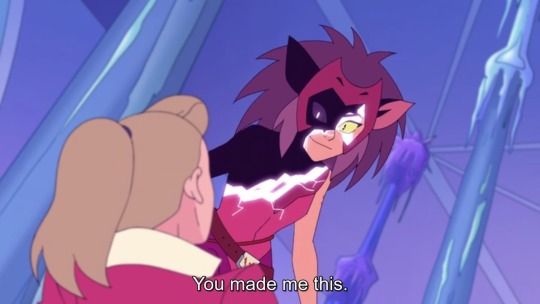
#good omens#good omens meta#good omens fandom#gomens#aziraphale#crowley#anthony j crowley#she ra spop#she ra#spop#she ra the princess of power#she ra and the princesses of power#spop catra#catra#neil gaiman#go s2#go season 2#go spoilers#go 2#gomens 2#good omemes#good omens memes#archangel aziraphale#archangel gabriel#the metatron#good omens spoilers#good omens 1941#good omens season 3#good omens season 2
190 notes
·
View notes
Text
I think the thing that really appeals me to catradora is the fact that they weren't supposed to make it.
Think about it for a second. Their whole lives they were pitted against each other, because Shadow Weaver wanted Adora and Catra only ever interfered with that. But they still built up their friendship. They made The Promise. They had each other, throughout their time in the Horde, despite Shadow Weaver desperately trying to drive a wedge in between them. They were never supposed to last, but they did.
And then when Adora finds the sword, becomes She-Ra and joins the rebellion - well they definitely weren't supposed to make it then. They were enemies, on opposite sides of the war. Yet, in early season 1 (pre-Promise) Catra still defends Adora in her absence. She lies to Shadow Weaver, lies to everyone about Adora being She-Ra and when SW finds out, she says "She's just confused". Still protecting Adora, despite her leaving. And Adora doesn't stop trying to convince Catra to join the rebellion, even though the rebellion would likely prefer it if she did. They weren't supposed to be fighting for each other - but they did.
And then Promise happens. Like Shadow Weaver, Light Hope sees Adora's friendship to Catra as a threat. So, she takes that wedge SW jammed inbetween them and drives it all the way home. She convinces Catra to cut Adora off, and convinces Adora to let go of her. And Light Hope succeeds where Shadow Weaver failed - they are now enemies. And they stay that way. This is how it was always supposed to be.
Then Catra opens the Portal. They get each other back for a second, but it only serves to prove they were never meant to last. Catra completely turns on Adora, and when it's over, Adora completely gives up on Catra. Any hope of reconciliation is shredded.
Catra continues on her downward spiral. Adora moves on. The war rages on, and they keep walking their separate paths. This was how it was supposed to end.
But then - then, in the rubble after the Heart of Etheria, at the moment Adora expects it the least, Catra saves Glimmer, and she apologises. She does this with no hope of seeing Adora again, and Adora doesn't know how to deal with it at first. If she was following the path laid out for her her entire life, she would have left Catra to die on Horde Prime's ship, grateful for her sacrifice, and grieving what could have been. That was how it was supposed to go, and it was exactly what Catra expected from her. But she defies it. She puts aside the greater good, and she storms Horde Prime's ship, for no other reason than that she wanted to. This is not what's supposed to happen.
In Save the Cat, Catra was supposed to serve Horde Prime. She's completely stripped of her autonomy, forced to fight Adora. She's supposed to break her. When she manages to break through - just a little bit - she is supposed to die. She falls off that platform, into the abyss, no hope left for her. Adora is supposed to let her. Instead, she summons She-Ra, and brings Catra back to life. They were never supposed to make it this far.
And it doesn't get easier. For a while, in Taking Control, they still don't really know how to act around each other. They have to learn it again. But they keep trying, against all odds. Catra starts to heal. Adora watches. They get to rekindle what they lost.
But then Shadow Weaver comes back, and the Failsafe happens. All their old wounds are raw again. SW is pressing all of Adora's old buttons, desperately reinforcing that wedge between them, so that Adora will take the Failsafe. At first, Catra resists this - she eavesdrops on Adora and SW conversation, and she seas her manipulation for what it is - and she tries to convince Adora to do the same. Ultimately she fails when Adora accepts the Failsafe. Catra knows that Adora is going to die being the hero, and she can't face that so she leaves. They are separated once again, and it doesn't look like there's any way back. It could have ended here too.
But in Heart, Catra sets down her hurt and her fear and she goes back to warn Adora of the new danger as Horde Prime hacks the planet. She finds Adora fighting for her life, and losing. Catra saves her, and allows SW to take Adora on to the Heart. She tries to sacrifice herself again. They both should have died there.
Only Adora comes back for her, once again. She rejects her destiny to save Catra. SW dies instead.
They've reached the final hurdle, the Heart itself. Adora can't transform into She-Ra, so she's doomed to die saving the world. Catra is supposed to let her.
But against all odds, they confess their love and it works. They both get to live.
This wasn't how it was supposed to go. At every turn the cards were stacked against them but they still won. They still made it. And I love that for them.
(sidenote but this is also why i love catra as a character and her whole arc. She was supposed to live a miserable life and die a miserable death but she got to live and change and grow as a person. Ugh I love this show)
#long post#catradora#spop#catra#adora#catradora meta#spop meta#spop meta in the year 2023? its more likely than you think
295 notes
·
View notes
Text

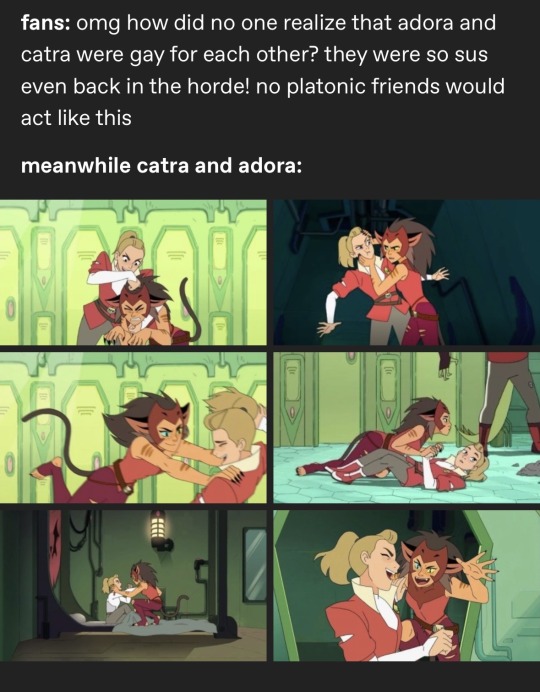
i’m not gonna lie… i’m lost here. is this supposed to be an 4nt1/cr1t1c4l post? if so, i genuinely don’t understand the point being made.
is it that playful banter is a bad thing? is it that being too hands-on violates unspoken boundaries? the message is so unclear to my autistic ass…
oh, wait, OP provided tags:

so aside from the fact that they are absolutely not sisters by default, least of all canonically (even if you do interpret them that way somehow), nor was it ever intended by nate stevenson, i’m still having trouble figuring out how this is problematic.
in which ways is lighthearted touch totally contradictory to passionate kissing/caressing? why can’t partners who are dating do both, especially in different cultural environments such as the horde where intimacy is discouraged and friendly sparring with familiar peers is a safe expression? if it’s so different, what are we as the audience supposed to interpret from their style of physical affection by the final season? side note, but aren’t we supposed to consider the latest version of anything in general as the most accurate?
now i have a question lol, did you take this moment literally at her word, and all the other times she repeated it?

also, my friend just pointed out that this is the classic homophobic talking point of "they seem to just be very good friends! they were roommates!" lmao. i've never agreed with accusing anyone who cr1t1c1z3s catradora of lesbophobia, which i'm not doing necessarily, because that's simply not how it works, however i found this funny and partially true so i'm keeping it in.
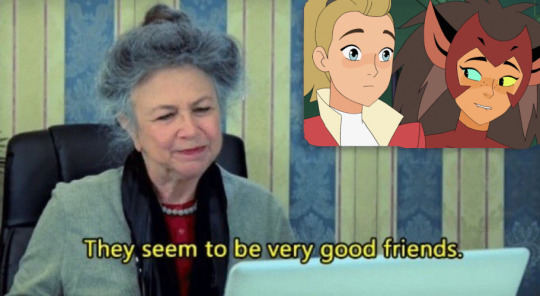
the lip bite was included unintentionally 👀

anyway, as i’ve discussed on this blog before, i’m very arospec and it’s inseparably intwined with my identity itself; i also project that onto catra. something we often bring up in that community, is romance-favorability (as its own spectrum of range all the way to blatant repulsion btw) — which is a personal preference that’s defined as exactly as it sounds like and occasionally revolves around fictional depiction as separate from one's own reality — and arguably more importantly, amatonormativity — which is an arbitrary set of rules for romantic expectations set up by an alloromantic society. this is typically thought of as common denial of the idea that someone could actually want to separate themself from needing a life partner in marriage, but can very much be applied to an annoying list of what draws the line between romantic & platonic relationships. that line is very individualistic and is to be decided on such a level only, and it doesn’t even get into what queerplatonic means, a concept saved for another day!
my point is, the OP seems to be trying to claim that catradora objectively cannot be read as romantic because their dynamic growing up & early-on in the story doesn’t perfectly meet socially-constructed standards of what that should look like. i say we need to eradicate those standards altogether! it’s up to catradora to decide what they are, if anything specific at all, not us as the audience — assuming they could’ve had the words at their disposal to knowingly describe it. going back to my earlier paragraph above about how limited they were in the fright zone, i’ll borrow a quote from a comment i made on one of my recent reblogged posts (which is a great meta on how their mutual desire was uh... definitely not platonic):
"Catra and Adora’s desire for one another is shown in a variety of ways, mostly indirect. There are a lot of glances - until season 5, not the kind of open leering at one another that we’d seen between other characters. Mostly it’s fairly playful - wiggled or cocked eyebrows, glances at each other while smirking, that kind of thing, or really intense and somewhat angry glares when they’re fighting."
it's really bothering me that i can't recall where i read this from before, but someone analyzed before how, growing up, catra & adora didn't have a good sense of how to label their relationship with accurate terminology despite being subconsciously aware that they, whether they knew the other reciprocated or not, loved each other "like that." unfortunately, they couldn't further explore it because such love & affection was seen as a punishable weakness in the horde, so they resorted to the only safe option they seemed to have, which was subtle body language and play-fighting as [testudoaubrei-blog] described above.
also, since this screenshot is included in that post... i would be amused to read an explanation of how THIS LOOK from catra is "platonic with a capital P", because i'm not even sure if it's up for debate to be quite honest with you:
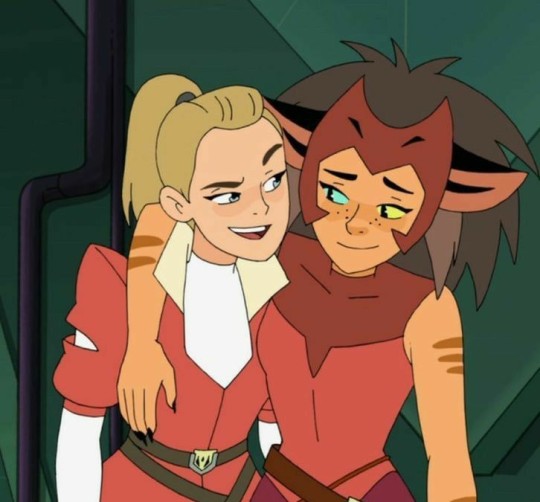
ESPECIALLY with the "i always have!" line (which 4nt1s like to doubt, but i don't care, it's official!):


#spop#she ra#she-ra#she-ra and the princesses of power#catradora#catra#adora#catra x adora#s3#season three#3x05#analysis#meta#discourse#aromantic#arospec#romance favorable#amatonormativity
47 notes
·
View notes
Text
No Thoughts Just How Powerful This Scene Was

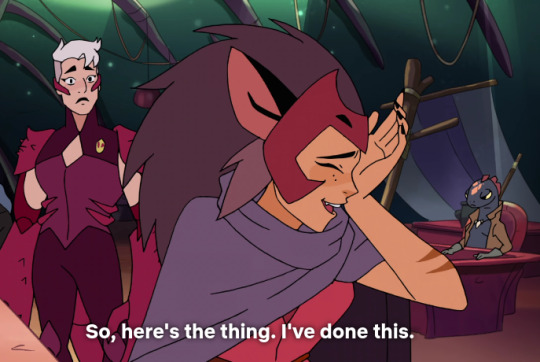


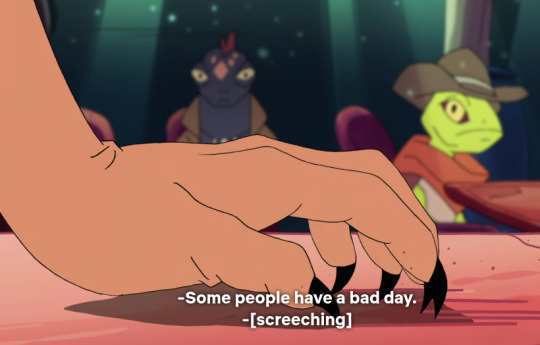

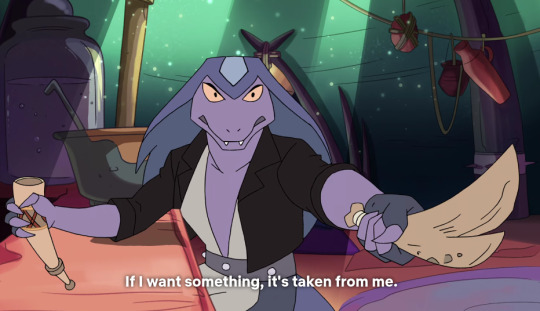


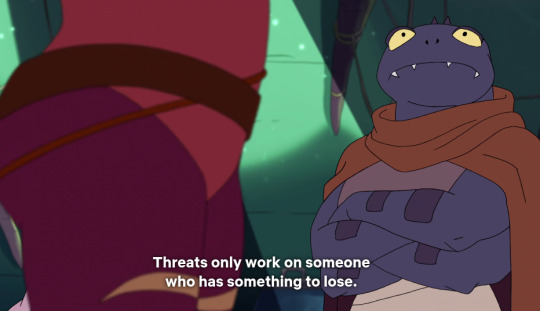


#spop#she ra and the princesses of power#catra#“chills literal chills”#nd knew what he was doing with this fucking scene#I could write a meta on this scene alone and its only like a minute long#catradora
335 notes
·
View notes
Text
Ngl, one of my absolute fave bits of popular post-spop-canon headcanons/fanon, is Catra becoming Glimmer's advisor and close friend.
It's one of those "oh, of course" kinds of things. Catra is extremely knowledgeable about the land that was under the Horde's control, far more than Hordak ever was. (He shoved that work off onto Shadow Weaver and then Catra.)
And...admittedly this includes land that became Horde-controlled under Catra's leadership. She still knows a lot about it. Geography, trade routes, that kind of thing.
But also, we know Etheria is, in general, not big on retribution or punishment--that was something only the Horde did. Instead people might be wary of you for a bit but if you prove yourself to have changed for the better, it's all good.
(This is so obviously not limited to Catra--Adora, Scorpia, Shadow Weaver!, Entrapta--they all worked for the Horde at some point, and/or did shitty things, and were all given a chance to be better. Whether SW was actually better is its own essay lol, but the rest of them. Yeah.)
So Glimmer making a public point of having Catra as her advisor would also be a very public way of saying "The past is in the past and we can all work towards a better future together."
#side note any Catra haters in the notes will be cheerfully blocked plz don't even bother :) thanks#spop#meta#my posts#BUT ALSO. TBH#Glimmer and Catra are v similar ppl (as has been pointed out repeatedly lol)#and they jsut get along when they're not forced to be on opposite sides#and I can just see them being Polite and Professional to everyone at official meetings and whatnot#and behind closed doors just cursing and joking constantly#but lbh I am also a bit of a glitra shipper pfft
192 notes
·
View notes
Text


i feel fairly certain prime had absolutely no intention of making chipped catra kill adora. nah. if anything, he chipped catra hoping he could cause adora to accidentally kill catra out of reflexive instinct.
like how catra takes a gnarly swift swipe with her claws at adora's neck just seconds after launching at her. she misses the first big swing and i can't help thinking it's no chance or luck on adora's part that catra's claws don't connect either.


cause he knew how badly it would break adora if he could force her to kill catra. i mean, just look at her expression after she reacts to catra's jump attack with a heavy punch to her face. adora had only said it moments before - "i don't wanna hurt you" - and she meant it. and i think prime was doing his best to take advantage of that.

he was pushing adora into a corner, tryna freak her out enough to do just that - hurt catra. then at some point i think adora gets extra stressed cause she realizes if prime can't get her to hurt catra - he'll just make catra hurt herself.

hurt adora? sure. maim adora? why not. but prime needed her alive. catra though? catra had gotten one over on him & laughed in his face. i think using her for this was just prime tryna have a lil fun killing two birds with one stone. but quite literally for catra.
i think he was just hoping to kill adora's spirit by making her do it. but adora strove to snap catra out of it & catra fought that chip till her entire body was shaking from how hard she was trying to keep control. the chip's influence over catra just couldn't compete with the power of their love for each other.

which was "disappointing. some creatures are destined only for destruction."

implying, to me, that since catra broke through the chip & adora obviously had helped get through to her on an even deeper level, prime no longer saw catra as a bargaining tool or of any use in controlling adora. he'd lost any kinda firm hold on catra's mind.

so he decides to go ahead and get rid of her. if he couldn't get adora to do it, he still wanted to make her watch while he did.
and eh -- big mistake. huge.

<3
#spop#she ra#adora#catra#catradora#chipped catra#save the cat#she ra analysis#spop meta#horde prime can't magicalculate
100 notes
·
View notes
Text
Serious question - do people actually hate Catradora?
Like. Their hate is so comical sometimes that it feels unreal. "Catra was an abusive child at six years old! She attacked poor innocent Octavia who's never done anything wrong in her life obviously!" That can not be a real criticism. It's one thing to say she was abusive toward Adora (i.e. the scratch in the flashback of Corridors, which is also a stupid example), but to say she was abusive to a grown-ass adult who was close enough for Catra's tiny arms to reach her eye in the first place? Give me a god damn break.
Or apparently Catra is selfish for asking Adora not to die at the end of the show? She was being manipulative and guilt tripping Adora into not sacrificing her life to save the world? Are you kidding me?
May I propose - you don't actually hate Catradora, you just hate seeing other people enjoy it, so you go through the show and find the most unforgiving reading of a scene then use it to spin a narrative so you can rain on everyone's parade because they're enjoying something you don't enjoy and therefore they're wrong.
95 notes
·
View notes
Text
rewatching once upon a time in the waste makes me so emo dude. because catra was so, so much happier the second she got far away from the horde. no constant question if she would be replaced, no constant need to justify every action, no feeling like the only reason people respected her was because of her rank. scorpia had shown beyond a shadow of a doubt that she cared about her, genuinely. I think that's why she was so carefree in the wastes. she was away from the constant expectations, and someone was watching her back. she could take her damn time because hordak didn't expect it all under a short deadline. she had scorpia to look out for her, they could goof off because they had time to mess around and she didn't have to constantly prove every single bit of worth. she showed she could do shit and people listened.
and the part that gets me is catra denying that she's miserable in the horde. when...yeah, she is. she literally hated it there, she was constantly stressed, she was constantly on the verge of a breakdown and it was completely unsustainable. scorpia was genuinely stating the facts. she hated the horde. she felt safe in the wastes because there was so much less pressure and she had someone who had her back. without that "come back with results, or else." over her head, she was so much less on edge.
but she goes back, because letting shadow weaver get away with hurting her feels like admitting defeat. it would be the best for her mental health, no doubt. but all she sees is that shadow weaver HAS to pay for what she did, she has to make her hurt like she did because of her. shes so caught up in rage and hurt. she could've been happy. she was just too scared to. she wanted to make shadow weaver feel the hurt she did, and all that ended up doing was denying herself what she really wanted: to be safe and wanted.
scorpia chose catra. catra was just too blinded by the fact shadow weaver didn't to see it until it was almost too late. fuck, man.
made princess scorpia hit so much harder. scorpia tried so hard to help catra. but she cannot fix her problems if catra wasn't willing to change. catra had to make that choice herself. scorpia deserves to be treated well too, and seeing her realize that was so cathartic. and no matter how much I love catra I am SO glad scorpia got out. god I love this show.
basically s3 was so good and set up the rest of the show so well thank you for coming to my ted talk.
#spop spoilers#shera spoilers#she ra spoilers#spop#she ra#shera#catra#catra she ra#she ra catra#shera catra#catra shera#spop catra#catra spop#scorpia shera#shera scorpia#she ra scorpia#scorpia she ra#spop scorpia#scorpia spop#candy meta
234 notes
·
View notes
Text
i do find it interesting how catra feels more guilty about the way she treated scorpia and entrapta, whom she knew for a few months or a year, at max, than she did about the way she treated adora, who was her best friend/sibling for as long as she could remember.
her face after she electrocutes entrapta says everything. while what she did was horrible, she did it out of impulse and was clearly horrified when she realized what she had done.

later on, she gets nightmares about what she did to entrapta, clearly hammering in the guilt.
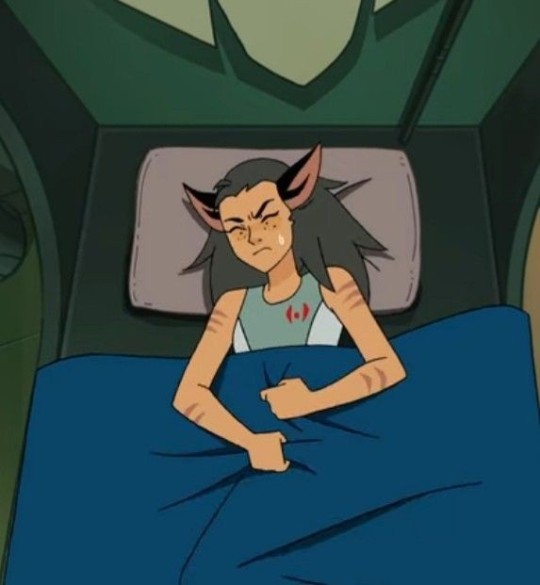
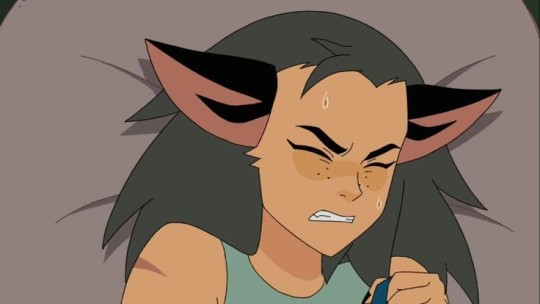
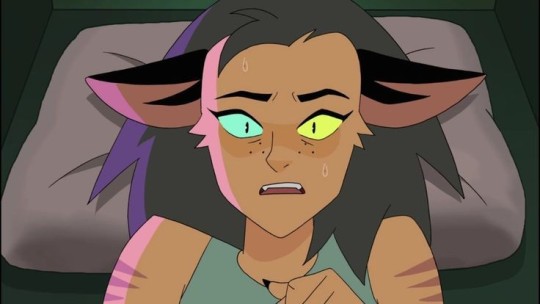
she doesn't do anything about it, of course, but at least it's made obvious that catra knows that what she did was wrong. again, remember that catra never seemed to like entrapta all that much. even though entrapta considered catra her friend, catra always seemed to be impatient and annoyed with entrapta.
later, when scorpia tells catra that she's a bad friend, it hits harder than anything else anyone has ever told her.
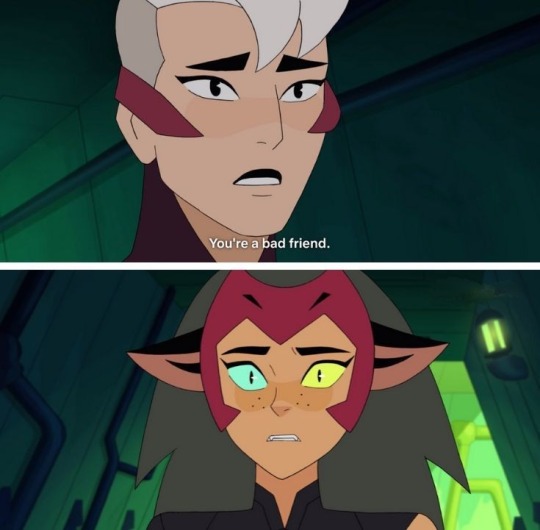
scorpia leaving was the straw that breaks the camel's back. this leads to her breakdown at the end of the season. this is the first time we see catra being truly devastated.
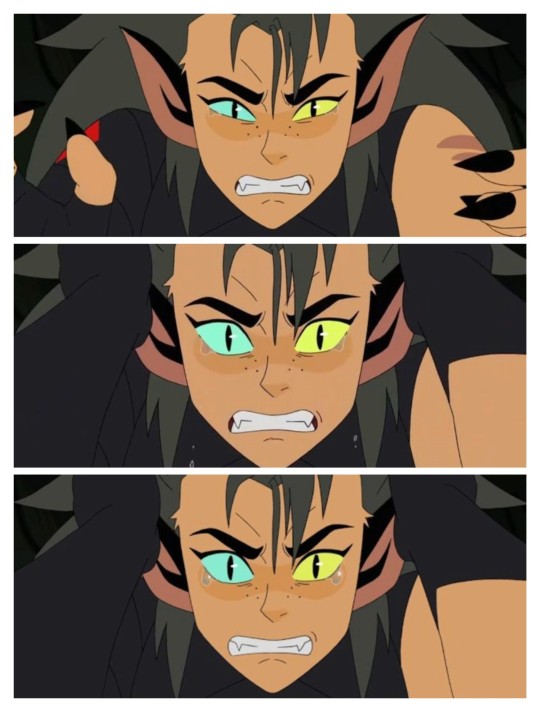
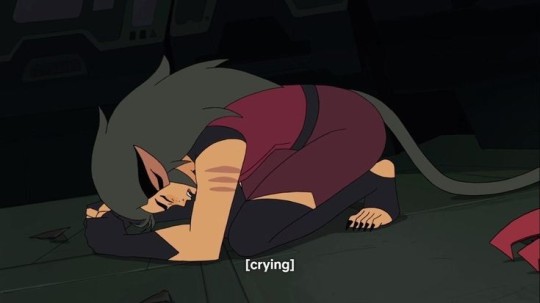
which further hammers in the fact that scorpia was probably the only person catra truly cared about.
contrast this to her reaction when adora calls her out during the portal scene.
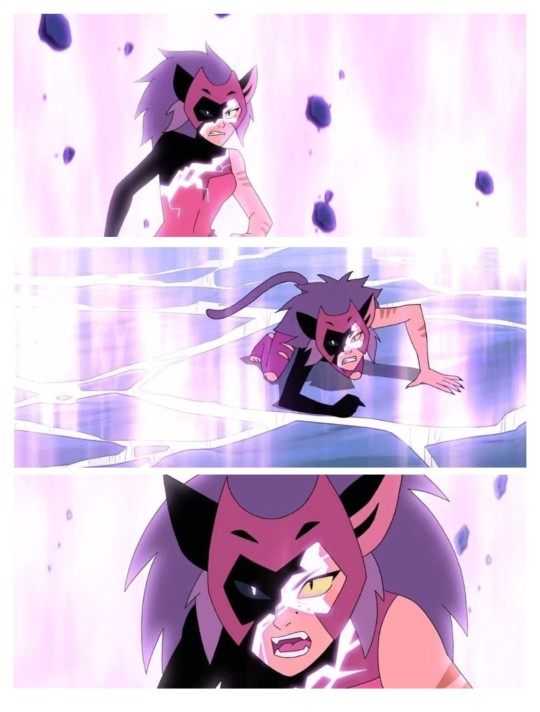
she's not shocked, she doesn't look guilty, she looks angry. she further tries to fight adora, springing her at every chance until adora decks her in the face.
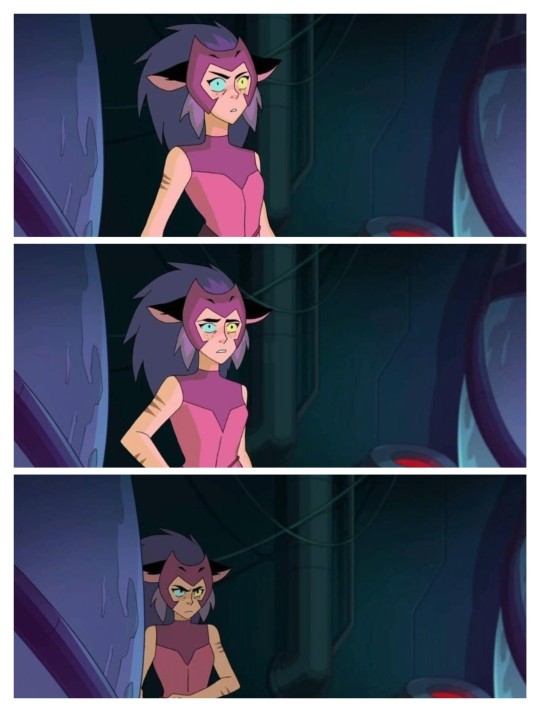
and after the portal is closed, catra looks scared but still shows no remorse for what she did. in fact, in the last frame, she just looks determined. and it's clear by her next appearance that she does not give a single flying fuck about adora's feelings. she continues torturing adora with a smile on her face and prides herself on angella's death.
so yeah. if catra showed remorse for hurting entrapta and scorpia, it's not that she's completely apathetic or doesn't realize her flaws. it's that she doesn't respect adora as a person and does not feel bad for hurting and trying to kill her. again, reminder that they had been friends for their whole life. if the show writers really wanted to show us that catra always loved adora, they should have shown at least a hint of remorse in catra's behaviour regarding adora, prior to s5. but nah, who cares about good writing when your audience is gullible enough to believe whatever you tell them, right?
#spop critical#spop salt#spop criticism#spop discourse#spop#she ra#anti catra#anti catradora#anti spop#anti c//a#antic//a#anticatra#anticatradora#spop meta
130 notes
·
View notes